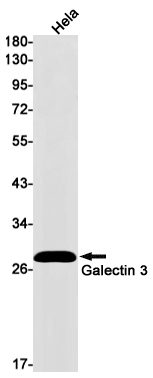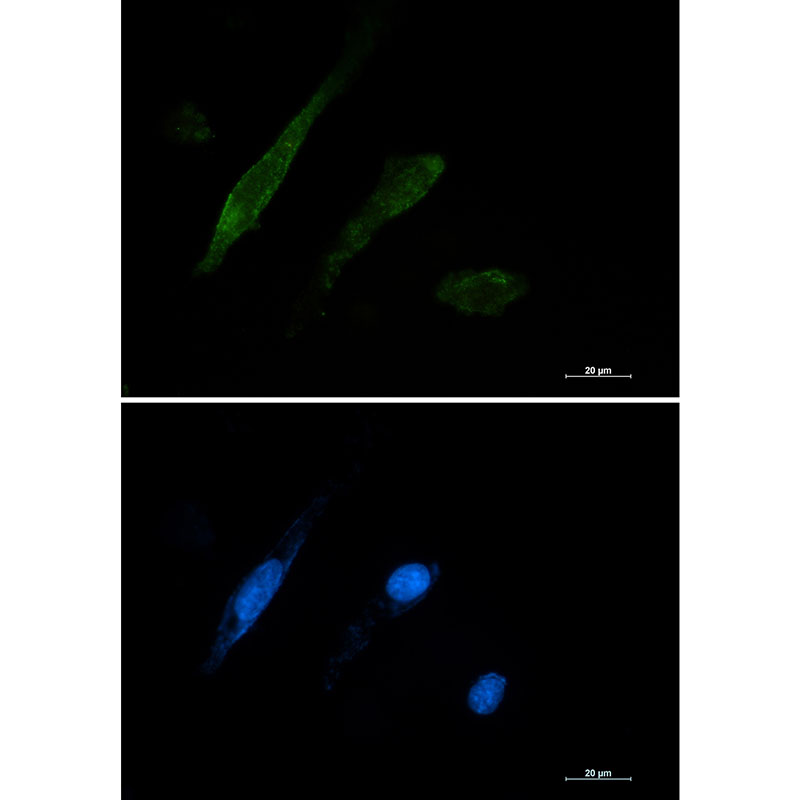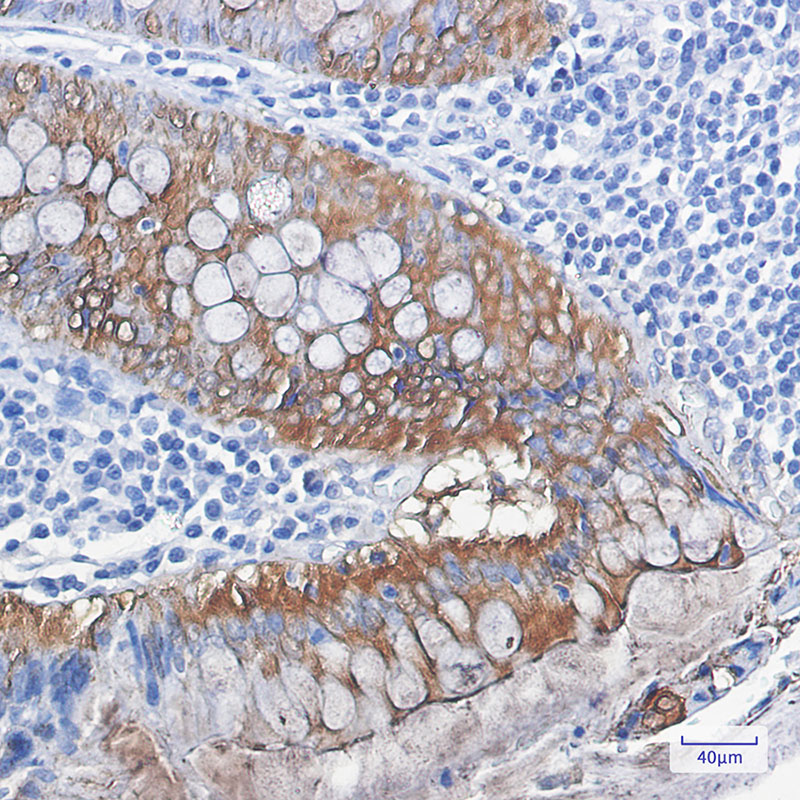


| WB | 咨询技术 | Human,Mouse,Rat |
| IF | 1/20 | Human,Mouse,Rat |
| IHC | 1/50-1/100 | Human,Mouse,Rat |
| ICC | 1/50-1/200 | Human,Mouse,Rat |
| FCM | 咨询技术 | Human,Mouse,Rat |
| Elisa | 咨询技术 | Human,Mouse,Rat |
| Aliases | LGALS3 |
| Entrez GeneID | 3958 |
| WB Predicted band size | Calculated MW: 26 kDa; Observed MW: 26 kDa |
| Host/Isotype | Rabbit IgG |
| Antibody Type | Primary antibody |
| Storage | Store at 4°C short term. Aliquot and store at -20°C long term. Avoid freeze/thaw cycles. |
| Species Reactivity | Human |
| Immunogen | Recombinant protein of human Galectin 3 |
| Formulation | Purified antibody in TBS with 0.05% sodium azide,0.05%BSA and 50% glycerol. |
+ +
以下是3篇关于Galectin 3抗体的参考文献,按研究领域分类概述:
---
1. **文献名称**:*Galectin-3 as a Multifaceted Driver of Tumor Progression*
**作者**:Raz A. et al.
**摘要**:综述Galectin-3在肿瘤进展中的作用,强调其作为诊断标志物的潜力,并讨论特异性抗体在检测肿瘤微环境中Galectin-3表达的应用价值。
---
2. **文献名称**:*Targeting Galectin-3 with Inhibitory Antibodies in Fibrotic Disease Models*
**作者**:Henderson N.C. et al.
**摘要**:研究Galectin-3抗体在肝和肺纤维化模型中的治疗效果,证明抗体可通过阻断Galectin-3与细胞外基质的相互作用减轻纤维化进展。
---
3. **文献名称**:*Anti-Galectin-3 Monoclonal Antibody Modulates Tumor Immunity in Pancreatic Cancer*
**作者**:Chen H.Y. et al.
**摘要**:探讨Galectin-3单克隆抗体(如MCP-1)通过调节巨噬细胞极化和T细胞活性增强抗肿瘤免疫反应,为胰腺癌治疗提供新策略。
---
如需具体文献年份或期刊,可进一步补充关键词或研究场景。
Galectin-3. a member of the β-galactoside-binding lectin family, is a multifunctional protein implicated in cell proliferation, apoptosis, inflammation, and cancer metastasis. Its unique structure, consisting of a carbohydrate-recognition domain (CRD) and an N-terminal proline-rich domain, enables interactions with glycoproteins and glycolipids, modulating intracellular signaling and extracellular matrix organization. Dysregulation of Galectin-3 is associated with fibrosis, cardiovascular diseases, and tumor progression, making it a therapeutic and diagnostic target.
Galectin-3 antibodies are tools designed to inhibit its pathogenic functions. In research, these antibodies help elucidate Galectin-3's role in diseases by blocking ligand binding or disrupting protein oligomerization. Therapeutically, they are explored for anti-fibrotic effects, such as reducing organ fibrosis, or in oncology to impede tumor immune evasion and metastasis. For instance, preclinical studies show antibody-mediated inhibition of Galectin-3 attenuates cardiac fibrosis and cancer cell adhesion. Clinically, Galectin-3-targeting agents like modified citrus pectin or small-molecule inhibitors have advanced to trials, though antibody-based therapies remain under investigation, partly due to challenges in specificity and delivery. Additionally, Galectin-3 antibodies serve as biomarkers in diagnostics, aiding risk stratification in heart failure or cancer prognosis. Despite promise, further studies are needed to optimize efficacy and safety for broader clinical translation.
×